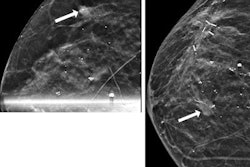Psychosocial factors influence how women adhere to breast cancer screening recommendations, including attending mammography appointments, according to research published January 21 in the Journal of Cancer Policy.
A team led by Biplab Datta, PhD, from Augusta University in Atlanta, GA found that women who are less likely to adhere to screening guidelines include those who are dissatisfied with their lives, those who lack emotional support, and those who feel socially isolated.
“Our findings demonstrated a strong association between social environment, psychological wellbeing, and adherence to breast cancer screening, and thus suggested scope of potential psychosocial interventions to improve adherence,” Datta and colleagues wrote.
Many women in the U.S. do not receive their recommended timely mammograms. Several barriers have been identified in women receiving screening, including those related to race and ethnicity, education, and financial constraints.
However, the researchers noted growing interest in how psychosocial factors could also have a role in preventing women from attending their appointments.
The Datta team studied how life satisfaction, receipt of emotional support, and feelings of social isolation are tied to women adhering to breast cancer screening recommendations as defined by the U.S. Preventive Services Task Force (USPSTF).
The researchers included data from 71,583 women between the ages of 50 and 74 from the 2022 Behavioral Risk Factor Surveillance System survey.
The team found that women who were dissatisfied with their lives were 52% less likely to adhere to guidelines compared with women who reported being very satisfied.
Also, women who rarely or never received emotional support were 51.6% less likely to adhere. Finally, women who reported being “always” or “usually” feeling socially isolated were 39.9% less likely to adhere.
The team also reported that these results were robust across various levels of income and education. For example, women who were dissatisfied with their life were between 66% (lower income, lower education) and 47.1% less likely (higher income, higher education) to adhere.
The same trends went for women who did not receive social support at 69.6% to 40.3% less likely to adhere across subgroups and women who felt social isolation at 68.8% to 31% less likely to adhere across subgroups.
The study authors suggested that efforts to improve women’s psychosocial well-being could improve women’s adherence to breast cancer screening recommendations.
“While policies aimed at equitable education and stable employment opportunities may facilitate improving psychosocial wellbeing at the upstream, downstream factors entail supporting individuals and families within communities and promoting community-level engagements,” they wrote. “Additionally, positive psychology interventions at the individual- and institutional- level, as part of broad public health initiatives could help improve efficacy of implementation.”
The full study can be found here.



















